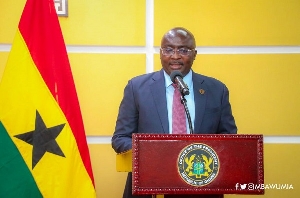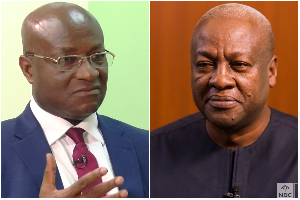The Vice President and the flagbearer of the New Patriotic Party (NPP), Dr Mahamudu Bawumia, has proposed granting equity stakes in mineral resources to traditional leaders within the respective jurisdictions.
The development, according the Vice President, would be a major solution to tackling illegal mining activities in the country and explained that the involvement of traditional leaders in land management, in collaboration with their district assemblies, could serve as a deterrent to illegal miners who often would exploit loopholes in regulatory systems.
Dr. Bawumia spoke at an engagement with professional bodies as part of his tour of the Ashanti Region.
He had earlier met with the Regional Traditional Council of Chiefs where he also mentioned that giving chiefs an equity stake would incentivise them to protect their lands from degradation and promote sustainable mining practices.
“The resource whether it’s a gold mine or whatever, when we find gold in your area, then you have a stake in it, an equity stake, the district assembly has an equity sake. Once you have an equity stake, you will not allow the land to be misused.”
He stressed the importance of regulating the small-scale miners, and making sure the chiefs were part of the district mining committee who would give the licences to the small-scale miners.
Dr Bawumia said it was important to regulate them and push them away from the water bodies, give them machinery and common facilities for more gold, as he referenced a geological department study that the unexplored gold in Ghana was five billion ounces equivalent to $10 trillion.
The Vice President also mentioned that he would give tax amnesty to all businesses and foreign individuals and also re-align Ghana’s import duty system to ensure flat rate import duties in Ghana cedis “so that we start respecting the cedi right from the port”.
He said, “I want a new policy that would say that Ghana’s import duty cannot be higher than that of Togo…then the smuggling will stop.”
Dr Bawumia further mentioned that he would transform Ghana from its cash-based economy to a credit system base as it was happening in advanced countries.
He was optimistic it could be possible with the kind of integrated database that Ghana has, thanks to digitalisation processes.
Realising that railway was important in nation-building, he underlined that the private sector would be encouraged with sufficient incentives to deal with it to create lot of jobs.
He touched on corruption, stating that he was committed to fighting it …”all that I have done in the digital space, systems that have been put in place are all that will fight corruption,” and urged Ghanaians to give him the nod.
The flagbearer mentioned that by 2030 all the European Union countries would have issued a digital ID to their citizens and explained how the Ghana Card had been integrated with other databases that had made it easier for such, saying “Ghana has already issued 18 million digital cards (Ghana Card) and we are following that up to children when born in the hospitals”.
Still on the importance of the Ghana Card, he indicated that “44,000 ghost names in the National Service Secretariat and 29,000 ghost names in SSNIT have all run away, saving the country millions of Ghana cedis”.
Business News of Sunday, 16 June 2024
Source: ghanaiantimes.com.gh

















